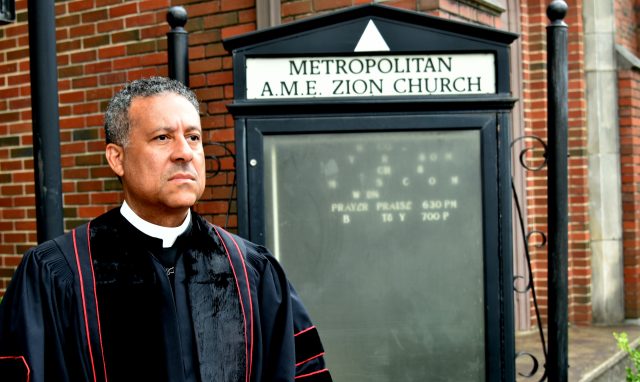
Solomon Crenshaw Jr.
For The Birmingham Times
Erskine Ramsay “Chuck” Faush Jr. didn’t get what he prayed for as his father’s health declined. But, he realizes now, God provided the right answer.
The COVID-19 pandemic began its ravaging global grip in late December 2019. The legendary Rev. Dr. Erskine R. Faush, Sr. had been declining for the past two years and by March, unrelated to the pandemic, had begun his transition.
“As the pandemic happened, the one thing that that I had prayed for not to happen is the one thing that did happen,” said the son. “And it was the absolute best thing because it was a way that people could participate. That was just absolutely what I believe God wanted.”
The elder Faush passed on April 25. Because of state and county health department restrictions, very few people were permitted to attend the service on Thursday, April 30.
The funeral was held at Metropolitan AME Zion Church downtown. It is one of the churches the senior Faush pastored during his career.
While in-person attendance at the funeral of the venerable pastor and radio personality wasn’t what it would have been, many were able to witness the proceedings online via Facebook Live.
“He actually was honored more because had there been a church full, there may not have been as many to react, respond, reach out virtually and especially through social media,” Faush, Jr. said. “Post-funeral, with the amount of people who could participate through the live (streamed) service, which we never would have had, and those who were able to take part.”
Faush, Jr. said he valued the condolences and comments that people typed while viewing the event online.
“If you think about it,” the son said, “he served people that he never saw through a microphone. Now, people get to respond back to him, or for him, who never ever met him.”
The service thus became participatory, not unlike the listeners who called in when the pioneering broadcaster was on the air for WENN Radio and then WATV.
“You’ve got to think about it,” Faush, Jr. said. “That’s not just ironic. That’s divine.”
The elder Faush operated on two platforms – in the pulpit and behind the microphone. He pastored three churches that went through significant refurbishing in his career as a pastor and ultimately rose to presiding elder in the AME Zion Church.
As a popular personality on what was the No. 1 station in the market, Faush, Sr. lent his voice to the Civil Rights Movement, the election of Birmingham’s first African-American Mayor, Richard Arrington Jr., and the installation of Oscar Adams as Supreme Court justice.
“It was aweing, a-w-e-i-n-g,” recounted Howard Johnson, whose Johnson Memorial Funeral Directors in Bessemer handled the arrangements. “With someone of his notoriety, it would have been basically full. It’s the true picture of where we are because no one was able to attend outside of the immediate family.
“It drove the point home,” he said.
Faush, Jr. did note the lack of caring hugs he and other family members would have received in a world that didn’t include a pandemic.
“That part has been tough because there’s something about the physical touch of being consoled or being encouraged, and that wasn’t there,” he said. “I forgot about that. That part was tough.”
The younger Faush had always wanted be able to honor the life of his father, the legendary radio preacher who had served so many for so long, in the way that he had honored others.
“It was incredibly sad that this minister, pastor who had eulogized and funeralized so many before would not be able to receive the same kind of honor,” Chuck said.
The younger Faush followed his father into the ministry. The pastor of two churches, including Ensley’s Trinity AME Zion Church that his father once led, Faush Jr. delivered the eulogy at his father’s service.
During the tribute, the son wore the robe his father gave him when the son received an honorary doctorate from Miles College in 2015. The funeral of the elder Faush proved to be a transformational experience for the son.
“On that day, it didn’t feel like (it was) just his (robe) anymore,” Chuck said, acknowledging that some try to impress people in wearing a robe and collar. “On that day, it was simply, and has become since then, about being a servant, a servant leader. And even though it had his name in it, it’s now my name.
“All my life I’ve been called Chuck,” the son said, “but Erskine is truly what happened on that day. It’s not just his anymore.”




